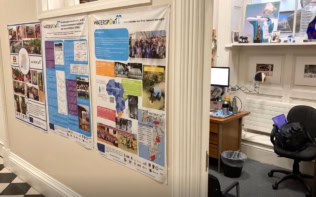Benyam Dejen, outreach director of the Blackett Lab Family, describes a three-day programme aimed at encouraging Black students to see physics as a subject for them

Across all state schools in England, Black ethnic groups are among the most under-represented at physics A-level. With so few Black students opting to study physics beyond the age of 16, it should come as no surprise that Black people make up barely 1.5% of UK undergraduate physics students. This extreme under-representation can also be seen at the pinnacle of the field, where among the 825 physics professors in the UK, there are incredibly few of Black heritage.
The Blackett Lab Family is a collective of UK-based Black physicists who aim to diversify perceptions of physics and promote Black representation at all levels. Our organization, which was founded in 2020 by a close-knit group of Black physics students, alumni and staff from Imperial College London, has since grown to encompass Black physicists across the country.
One of our key objectives is to increase the number of Black UK-based students doing physics or physics-related courses or schemes. That’s why in July 2023 we ran a three-day physics experience for students of Black heritage in years 11 and 12 (ages 15 to 17). It aimed to shed light on what studying physics at university involves, to promote the value of physics to society, to strengthen the students’ physics identities and to show the benefits of diversity in physics.
Some 32 students based in London took part in Representing Physics 2023, which was launched in partnership with the Ogden Trust, Imperial College London, the National Physical Laboratory (NPL) and the Institute of Physics (IOP), which publishes Physics World. On the first day, the students were given a full taster of the undergraduate experience at Imperial. They attended, for example, lectures on topics such as special and general relativity, quantum physics and nanophotonics.
We also wanted the students to get a taste of lab work, which is a key part of the undergraduate experience. Unfortunately, schools often have limited resources and time to develop the skills to conduct experiments, which can end up dissuading students from pursuing physics at university. We therefore gave students a tour of Imperial’s undergraduate labs and led them through experiments in electromagnetism. We ended the day discussing the options available to them, providing tips on how to write strong applications, and giving advice for academic success at A-level.
The second day of the programme was hosted at the NPL, where our students visited labs, met scientists and engineers, and were shown the value of physics to society. They saw, for example, the lab from which time signals are distributed to the whole of the UK. These tangible examples of how the work of physicists benefits people’s lives are invaluable for students who often don’t fully appreciate how physics helps wider society. Members of the Blackett Lab Family who work in areas such as finance, law and medicine also met the students, telling them about their careers and how they use the skills from their physics degrees.
We need the physics community to play a greater role in supporting initiatives like ours
The final day – hosted at the IOP – saw a variety of interactive workshops to help the students recognize and strengthen their “physics identity”. Research carried out by the American Institute of Physics has shown that physics identity – essentially how you see yourself in physics – is critical when it comes to minoritized students succeeding in physics. The students also shared personal experiences that they felt had either threatened or affirmed their physics identities, and brainstormed solutions to strengthen their identity and to empower themselves.
Given that we often draw strength and guidance from role models, it was crucial that students on the programme learn about great physicists who look like them, who have similar backgrounds and who they can look up to. With relatively few Black physicists in the mainstream, the students took part in an interactive research activity in which they discovered and shared examples of trailblazing Black physicists such as Clifford Johnson at the University of Southern California. Royal Society launches fellowships to support Black scientists
We believe that it is important to get buy-in from parents, guardians and carers to support their child’s choice of pursuing physics, and to demonstrate to the students that they will be supported throughout their physics journey. So we invited parents, carers, guardians and siblings, along with our project partners and supporters, to a ceremony to celebrate the completion of the programme.
While the students enjoyed the course – one even saying it was the best three days of their life – there is still much to do. If every student in this tiny cohort went on to study physics at university, the population of Black physics undergraduates would increase by over 10%, but this would only tilt the balance of representation slightly. For each student who attended the programme, there are thousands more across the rest of the UK who would have greatly benefited from an experience like this. We barely scratched the surface.
Society will also greatly benefit from many more young people from different backgrounds becoming enthusiastic about physics, so we need the physics community to play a greater role in supporting initiatives like ours. To adapt an old saying, it takes a community to raise a physicist.




